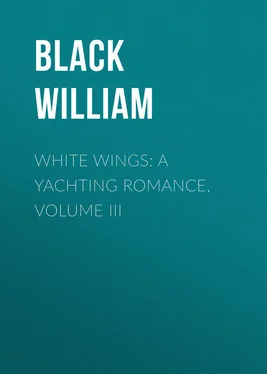William Black - White Wings - A Yachting Romance, Volume III
Здесь есть возможность читать онлайн «William Black - White Wings - A Yachting Romance, Volume III» — ознакомительный отрывок электронной книги совершенно бесплатно, а после прочтения отрывка купить полную версию. В некоторых случаях можно слушать аудио, скачать через торрент в формате fb2 и присутствует краткое содержание. Жанр: foreign_antique, foreign_prose, на английском языке. Описание произведения, (предисловие) а так же отзывы посетителей доступны на портале библиотеки ЛибКат.
- Название:White Wings: A Yachting Romance, Volume III
- Автор:
- Жанр:
- Год:неизвестен
- ISBN:нет данных
- Рейтинг книги:4 / 5. Голосов: 1
-
Избранное:Добавить в избранное
- Отзывы:
-
Ваша оценка:
- 80
- 1
- 2
- 3
- 4
- 5
White Wings: A Yachting Romance, Volume III: краткое содержание, описание и аннотация
Предлагаем к чтению аннотацию, описание, краткое содержание или предисловие (зависит от того, что написал сам автор книги «White Wings: A Yachting Romance, Volume III»). Если вы не нашли необходимую информацию о книге — напишите в комментариях, мы постараемся отыскать её.
White Wings: A Yachting Romance, Volume III — читать онлайн ознакомительный отрывок
Ниже представлен текст книги, разбитый по страницам. Система сохранения места последней прочитанной страницы, позволяет с удобством читать онлайн бесплатно книгу «White Wings: A Yachting Romance, Volume III», без необходимости каждый раз заново искать на чём Вы остановились. Поставьте закладку, и сможете в любой момент перейти на страницу, на которой закончили чтение.
Интервал:
Закладка:
But the more prudent counsels of John of Skye at length prevail, and there is a call to the men forward to stand by. Then down goes the helm; her head slews round with a rattling of blocks and cordage; the sheets of the head-sails are belayed to leeward; and then, with the boom away over the starboard davits, we are running free before this freshening breeze.
But the night is dark as we cautiously creep in under the vast shadows of the Jura hills. Fortunately in here the wind is light; the White Dove seems to feel her way through the gloom. All eyes are on the look-out; and there is a general shout as we nearly run on a buoy set to mark a sunken ship. But we glide by in safety; and in due course of time the roar of the anchor chain tells us that we are snug for the night.
"But where is Miss Mary?" says the Laird, in the cheerfully-lit saloon. He looks around him in an uncomfortable and unsettled way. The saloon is not the saloon when Mary Avon is out of it; here is her chair next to his as usual, but it is vacant. How are we to spend the last happy hour of chatting and joking without the pleased, bright face, and the timid, gentle, shy, dark eyes?
"Mary has gone to her cabin," says her hostess. "I suppose she has a headache."
She supposes the girl has a headache, and has not asked! And can it be really Mary Avon that she is speaking of in that cold, hurt, offended way?
CHAPTER III.
IN THE DARK
And then the next morning the Laird is infinitely distressed.
"What! not better yet?" he says. "Dear me! I wish I could be a woman for a while, to take some tea in to her, and read to her, and coax her into better spirits. What a bad headache it must be!"
But this generous sympathy on the part of one who is little more than an acquaintance touches the heart of Mary Avon's particular friend. She reproaches herself for her cruelty. She not only gets the tea and takes it into the cabin, but she adopts a domineering tone, and declares that until the young lady begins her breakfast she will not leave the place. And then she looks at the timid, worn face; and her hand is placed gently on the hand of her friend, and she says in a lower voice —
"Mary, don't think I am angry. I am only a little bit disappointed. But I don't blame you – you could not help it. It is a pity; that is all."
The girl's face remains rather sad; but she is quite self-possessed.
"You will let me go away," she says, looking down, "when we get to some harbour?"
"There is no need," says her friend, regarding her. "Angus will leave us to-day, as soon as we get across to Cantyre."
"Oh!" she said, quickly, and looking tip with a brief appeal in her eyes. "I hope not! Why should he go away? I must go; I would rather go."
"Oh, no, Mary!" her friend said. "If there is any 'must' in the matter, it is on his side; for you know his time is very valuable, and you must have guessed why he has already far exceeded what he proposed to himself as his holiday. No, no, Mary; let us forget what has happened as soon as we can, and make the best of the rest of our sailing. The Laird would have a fit if you seriously threatened to go. And I am sure you are not to blame."
So she kissed her on the cheek, by way of reconciliation, and left. And she told the Laird that Mary had been dutiful, and had taken some breakfast, and would be up on deck in course of time.
Meanwhile, those who had gone on deck had found the White Dove lying in a dead calm, some three miles away from her anchorage of the previous night; her sails hanging limp; a scorching sun on the white decks, and a glare of light coming from the blue sky and the glassy blue sea.
"Well, Angus," says his hostess, very merrily – for she does not wish to let the others guess the reason of his sudden departure; "you see the weather does not approve of your leaving us. What has become of your thunderstorm? Where is the gale from the south, John?"
"I was never seeing the like of this weather, mem," said the bearded skipper. Then he added, anxiously, "And is Dr. Sutherland himself going away from the yat?"
"He would like to," she says; "but how is he ever to see land again if you banish the wind so?"
"But it will no be like this long!" says Captain John, eagerly – for he appears to think that Dr. Sutherland has got tired of the fine weather. "Oh, no, mem! I will answer for it. If Dr. Sutherland will wait another day, or two days, I am sure there will be plenty of wind. And we can lie in West Loch Tarbert for one day, or two days – "
"And starve?" she says, abruptly.
But now it appears that one or two of the men have heard of a mysterious village lying somewhere inland from the mouth of the loch; and from a comparison of these vague rumours we gather that we may not be so far from civilisation after all. Perhaps we may once again behold loaf-bread. Visions of cutlets, fowls, grouse, and hares arise. We shall once more hear some echo of the distant world if perchance there be in the place a worn and ancient newspaper.
"Ay," said the Laird, hastily. "I would like to see a Glasgow newspaper! I'm thinking they must have got the steam fire-engine by now; and fine games the bairns will have when they begin to practise with it, skelping about in the water. It would be a grand thing to try it in the public garden when we get it; it would keep the shrubs and the borders fine and wet – eh?"
"And it would be quite as interesting as any plaster fountain," says his hostess, encouragingly.
"As handsome every bit," says the Laird, laughing heartily at his play of imagination, "as any bit laddie done up in stucco, standing on one leg, and holding up a pipe! It's a utilitarian age, ma'am – a utilitarian age; we will have instead of a fountain a steam fire-engine – very good! very good! – and they bodies who are always crying out against expenditure on decoration will be disappointed for once."
The Laird had at last discovered the whereabouts of the mysterious village on the Admiralty chart.
"But what newspaper will we get in a place hidden away like that? – out of the reach of all communication wi' the world. They'll be a century behind, mark my words. It is when ye live within a reasonable distance of a great centre of ceevilisation, like Glasgow, that ye feel the life of it stirring your own place too; and ye must keep up with the times; ye must be moving. Conservative as I am, there is no supersteetious obstinacy about me; moving – moving – that's the word. The more important the matter in the interest of the public, the more necessary is it that we should have an impartial mind. If ye show me a new sort of asphalte, do ye think I would not examine it, jist because I recommended Jamieson and MacGregor's patent?"
He appealed boldly to his hostess.
"Oh, certainly; certainly you would!" she says, with an earnestness that might have made Jamieson and MacGregor quail.
"For three weeks," says the Laird, solemnly, "I was on that committee, until it seemed that my breakfast, and my dinner, and my supper every day was nothing but tar-smoke. What wi' the experiments without and within, I was just filled with tar-smoke. And would ye believe it, ma'am, one o' they Radical newspapers went as far as to say there were secret influences at work when Jamieson and MacGregor was decided on. My friends said, 'Prosecute the man for libel;' but I said, 'No; let the poor crayture alone; he has got to earn his living!'"
That was very wise of you, sir," says his hostess.
"Bless me! If a man in public life were to heed everything that's said about him," observes the Laird, with a fine air of unconcern, "what would become of his time? No, no; that is not the principle on which a public man should found his life. Do your best for your fellow-creatures, and let the squabblers say what they like. As ah say, the poor wretches have to earn their living."
Читать дальшеИнтервал:
Закладка:
Похожие книги на «White Wings: A Yachting Romance, Volume III»
Представляем Вашему вниманию похожие книги на «White Wings: A Yachting Romance, Volume III» списком для выбора. Мы отобрали схожую по названию и смыслу литературу в надежде предоставить читателям больше вариантов отыскать новые, интересные, ещё непрочитанные произведения.
Обсуждение, отзывы о книге «White Wings: A Yachting Romance, Volume III» и просто собственные мнения читателей. Оставьте ваши комментарии, напишите, что Вы думаете о произведении, его смысле или главных героях. Укажите что конкретно понравилось, а что нет, и почему Вы так считаете.












